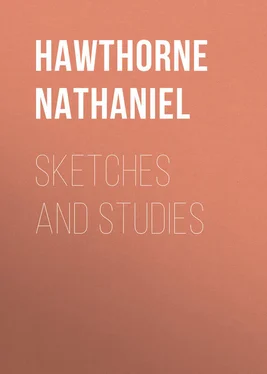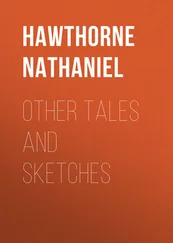Nathaniel Hawthorne - Sketches and Studies
Здесь есть возможность читать онлайн «Nathaniel Hawthorne - Sketches and Studies» — ознакомительный отрывок электронной книги совершенно бесплатно, а после прочтения отрывка купить полную версию. В некоторых случаях можно слушать аудио, скачать через торрент в формате fb2 и присутствует краткое содержание. Жанр: literature_19, foreign_antique, foreign_prose, на английском языке. Описание произведения, (предисловие) а так же отзывы посетителей доступны на портале библиотеки ЛибКат.
- Название:Sketches and Studies
- Автор:
- Жанр:
- Год:неизвестен
- ISBN:нет данных
- Рейтинг книги:5 / 5. Голосов: 1
-
Избранное:Добавить в избранное
- Отзывы:
-
Ваша оценка:
- 100
- 1
- 2
- 3
- 4
- 5
Sketches and Studies: краткое содержание, описание и аннотация
Предлагаем к чтению аннотацию, описание, краткое содержание или предисловие (зависит от того, что написал сам автор книги «Sketches and Studies»). Если вы не нашли необходимую информацию о книге — напишите в комментариях, мы постараемся отыскать её.
Sketches and Studies — читать онлайн ознакомительный отрывок
Ниже представлен текст книги, разбитый по страницам. Система сохранения места последней прочитанной страницы, позволяет с удобством читать онлайн бесплатно книгу «Sketches and Studies», без необходимости каждый раз заново искать на чём Вы остановились. Поставьте закладку, и сможете в любой момент перейти на страницу, на которой закончили чтение.
Интервал:
Закладка:
The first civil office, I imagine, which Franklin Pierce ever held was that of chairman of the standing committee of the Athenaean Society, of which, as above hinted, we were both members; and, having myself held a place on the committee, I can bear testimony to his having discharged not only his own share of the duties, but that of his colleagues. I remember, likewise, that the only military service of my life was as a private soldier in a college company, of which Pierce was one of the officers. He entered into this latter business, or pastime, with an earnestness with which I could not pretend to compete, and at which, perhaps, he would now be inclined to smile. His slender and youthful figure rises before my mind’s eye, at this moment, with the air and step of a veteran of the school of Steuben; as well became the son of a revolutionary hero, who had probably drilled under the old baron’s orders. Indeed, at this time, and for some years afterwards, Pierce’s ambition seemed to be of a military cast. Until reflection had tempered his first predilections, and other varieties of success had rewarded his efforts, he would have preferred, I believe, the honors of the battle-field to any laurels more peacefully won. And it was remarkable how, with all the invariable gentleness of his demeanor, he perfectly gave, nevertheless, the impression of a high and fearless spirit. His friends were as sure of his courage, while yet untried, as now, when it has been displayed so brilliantly in famous battles.
At this early period of his life, he was distinguished by the same fascination of manner that has since proved so magical in winning him an unbounded personal popularity. It is wronging him, however, to call this peculiarity a mere effect of manner; its source lies deep in the kindliness of his nature, and in the liberal, generous, catholic sympathy, that embraces all who are worthy of it. Few men possess any thing like it; so irresistible as it is, so sure to draw forth an undoubting confidence, and so true to the promise which it gives. This frankness, this democracy of good feeling, has not been chilled by the society of politicians, nor polished down into mere courtesy by his intercourse with the most refined men of the day. It belongs to him at this moment, and will never leave him. A little while ago, after his return from Mexico, he darted across the street to exchange a hearty gripe of the hand with a rough countryman upon his cart – a man who used to “live with his father,” as the general explained the matter to his companions. Other men assume this manner, more or less skilfully; but with Frank Pierce it is an innate characteristic; nor will it ever lose its charm, unless his heart should grow narrower and colder – a misfortune not to be anticipated, even in the dangerous atmosphere of elevated rank, whither he seems destined to ascend.
There is little else that it is worth while to relate as regards his college course, unless it be that, during one of his winter vacations, Pierce taught a country school. So many of the statesmen of New England have performed their first public service in the character of pedagogue, that it seems almost a necessary step on the ladder of advancement.
CHAPTER II
After leaving college, in the year 1824, Franklin Pierce returned to Hillsborough. His father, now in a green old age, continued to take a prominent part in the affairs of the day, but likewise made his declining years rich and picturesque with recollections of the heroic times through which he had lived. On the 26th of December, 1825, it being his sixty-seventh birthday, General Benjamin Pierce prepared a festival for his comrades in arms, the survivors of the Revolution, eighteen of whom, all inhabitants of Hillsborough, assembled at his house. The ages of these veterans ranged from fifty-nine up to the patriarchal venerableness of nearly ninety. They spent the day in festivity, in calling up reminiscences of the great men whom they had known and the great deeds which they had helped to do, and in reviving the old sentiments of the era of ‘seventy-six. At nightfall, after a manly and pathetic farewell from their host, they separated – “prepared,” as the old general expressed it, “at the first tap of the shrouded drum, to move and join their beloved Washington, and the rest of their beloved comrades, who fought and bled at their sides.” A scene like this must have been profitable for a young man to witness, as being likely to give him a stronger sense than most of us can attain of the value of that Union which these old heroes had risked so much to consolidate – of that common country which they had sacrificed everything to create; and patriotism must have been communicated from their hearts to his, with somewhat of the warmth and freshness of a new-born sentiment. No youth was ever more fortunate than Franklin Pierce, through the whole of his early life, in this most desirable species of moral education.
Having chosen the law as a profession, Franklin became a student in the office of Judge Woodbury, of Portsmouth. Allusion has already been made to the friendship between General Benjamin Pierce and Peter Woodbury, the father of the judge. The early progress of Levi Woodbury towards eminence had been facilitated by the powerful influence of his father’s friend. It was a worthy and honorable kind of patronage, and bestowed only as the great abilities of the recipient vindicated his claim to it. Few young men have met with such early success in life, or have deserved it so eminently, as did Judge Woodbury. At the age of twenty-seven, he was appointed to the bench of the Supreme Court of the state, on the earnest recommendation of old General Pierce. The opponents of the measure ridiculed him as the “baby judge;” but his conduct in that high office showed the prescient judgment of the friend who had known him from a child, and had seen in his young manhood already the wisdom of ripened age. It was some years afterwards when Franklin Pierce entered the office of Judge Woodbury as a student. In the interval, the judge had been elected governor, and, after a term of office that thoroughly tested the integrity of his democratic principles, had lost his second election, and returned to the profession of the law.
The last two years of Pierce’s preparatory studies were spent at the law school of Northampton, in Massachusetts, and in the office of Judge Parker at Amherst. In 1827, being admitted to the bar, he began the practice of his profession at Hillsborough. It is an interesting fact, considered in reference to his subsequent splendid career as an advocate, that he did not, at the outset, give promise of distinguished success. His first case was a failure, and perhaps a somewhat marked one. But it is remembered that this defeat, however mortifying at the moment, did but serve to make him aware of the latent resources of his mind, the full command of which he was far from having yet attained. To a friend, an older practitioner, who addressed him with some expression of condolence and encouragement, Pierce replied, – and it was a kind of self-assertion which no triumph would have drawn oat, – “I do not need that. I will try nine hundred and ninety-nine cases, if clients will continue to trust me, and, if I fail just as I have today, will try the thousandth. I shall live to argue cases in this court house in a manner that will mortify neither myself nor my friends.” It is in such moments of defeat that character and ability are mot fairly tested; they would irremediably crush a youth devoid of real energy, and, being neither more nor less than his just desert, would be accepted as such. But a failure of this kind serves an opposite purpose to a mind in which the strongest and richest qualities lie deep, and, from their very size and mass, cannot at once be rendered available. It provokes an innate self-confidence, while, at the same time, it sternly indicates the sedulous cultivation, the earnest effort, the toil, the agony, which are the conditions of ultimate success. It is, indeed, one of the best modes of discipline that experience can administer, and may reasonably be counted a fortunate event in the life of a young man vigorous enough to overcome the momentary depression.
Читать дальшеИнтервал:
Закладка:
Похожие книги на «Sketches and Studies»
Представляем Вашему вниманию похожие книги на «Sketches and Studies» списком для выбора. Мы отобрали схожую по названию и смыслу литературу в надежде предоставить читателям больше вариантов отыскать новые, интересные, ещё непрочитанные произведения.
Обсуждение, отзывы о книге «Sketches and Studies» и просто собственные мнения читателей. Оставьте ваши комментарии, напишите, что Вы думаете о произведении, его смысле или главных героях. Укажите что конкретно понравилось, а что нет, и почему Вы так считаете.












